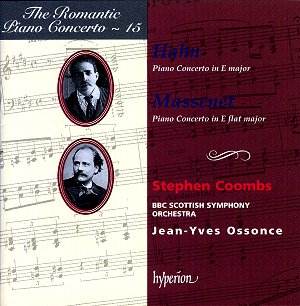Like so much of Massenetís music, this is all tunefully
appealing music. More renowned for his operas than anything else, apart
from the ballet music in such operas as Le Cid, one is rarely
given a chance to hear Massenet in a purely orchestral medium; normally
such a body of players would be consigned to the role of accompanying
the human voice from a pit in an opera house. Despite the best efforts
of all involved, and Stephen Coombs is a fine player, the music is dangerously
dull, only in the last movement is there any natural energy and sense
of propulsion in the rhythms, tempo and style. Even so it is curious
why Massenet should have chosen Slovakian themes for the dance tunes,
rather than those from colonial Africa, which Saint-Saëns would
have done. Before that it tends to coast along in another Saint-Saëns
sort of way, indeed the pretty tinkling music assigned to the fishes
in that composerís Carnival of the Animals springs, or should
one say swims in, to mind in the first two movements of Massenetís concerto.
Strange really as the composer was already sixty when he finally wrote
it, but it sounds as if he was still making exploratory forays into
developing the musical ideas for the work which do in fact stem from
his youth. Perhaps it was being in the relatively unfamiliar waters
of the concert hall rather than the opera house which explains this
sense of unease. Liszt was impressed by Massenetís piano playing and
encouraged him, even to the extent of finding a wife for him by passing
on a beautiful pupil for him to teach and then marry.
Massenet in turn taught Reynaldo Hahn composition from
1887. Hahnís concerto is much better than his masterís, more interesting,
inventive and ear-catching. Ravel was a contemporary and it sounds like
it in places (occasional solo moments for percussion, harp, cor anglais,
trumpet and so on), though for 1931 itís a conservative piece of music
in the best sense of the word, moments of Chopin, Liszt and of course
the inevitable Rachmaninov. Like his teacher before him, Hahn produced
his single piano concerto towards the end of his life. It may well be
that he wrote it precisely as a throwback to earlier days when music
was ostensibly more elegant and charming. Certainly this is a work worthy
of revival to stand with Ravelís G major concerto; the orchestration
is masterful, the melodic invention inspired. A splendid performance
is given by all concerned, but what a pity the lively and witty (Satie
perhaps?) second movement scherzo is so short. Incidentally when Hahn
recorded it with Magda Tagliaferro in 1937, it had to be heavily cut,
but this is a fully restored version, as intended by the composer.
Itís a disc worth its money for Hahnís fine concerto
alone.
Christopher Fifield
Hyperion
Romantic Piano Concerto Series


